Posts Tagged ‘Vaclav Havel’
PEN Journey 34: Diyarbakir and Beyond—Finding Byways for Peace
PEN International celebrates its Centenary in 2021. I’ve been active in PEN for more than 30 years in various positions and now as an International Vice President Emeritus. With memories stirring and file drawers of documents and correspondence bulging, I am a bit of a walking archive and have been asked by PEN International to write down memories. I hope this personal PEN journey will be of interest.
PEN has always been about building bridges, finding the byways of fellowship among writers whose currency is language and imagination and whose hope is that even with radically different histories and backgrounds, writers might find a way to sit down across a table from each other and share stories and listen to each other and thereby have a beneficent influence on the way they and their societies see themselves and others.
It is an idealistic goal that has been battered in PEN’s hundred year history, and yet the organization continues; the dialogues continue, and writers from over 100 countries continue to meet and talk, even from countries whose governments have not found peace in decades. There have been moments of seeing that optimism realized, at least for a time, and also seeing it smashed.
The next section of these PEN Journeys covering the years 2004 (PEN Journey 33) through 2007 (August) will focus on my years as International Secretary of PEN International. I will travel through events chronologically, the number of events increasing considerably as the role demanded. I will try to knit these together as we continually try to do as an organization.
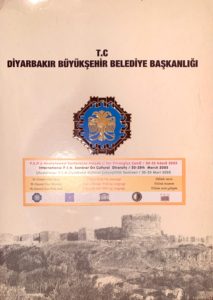
International PEN Seminar on Cultural Diversity in Diyarbakir, Turkey, March 2005
In January, 2005 we held our first board meeting of the year in Vienna where PEN President Jiří Gruša had recently taken up the position as Director of the Diplomatic Academy of Vienna which hosted us. The formal board meeting itself took place in the basement of the hotel restaurant where we were staying. Around the table in the cozy space where we sat on chairs and on a long booth was PEN’s diverse board from Algeria, Colombia, France, USA, Czech Republic, Denmark, Finland, Croatia, Australia, Norway and Japan. The search for an executive director, the new financial and employment systems going into place in the office, an upcoming meeting in Stavanger, Norway with the old Cities of Asylum Network, and an upcoming meeting in Diyarbakir, Turkey with Kurdish and Turkish PEN—all populated the agenda as did the omnipresent discussions on fundraising.
For me, the imminent departure of my Marine son from the combat zone in Iraq hovered in the corner of my mind. We were staying at a pension hotel with small rooms—single bed, dresser and nightstand; I could almost touch the walls on both sides. Outside it was snowing. I’d come to Vienna unprepared for the snow and had bought at a sale a large puffy yellow coat that now draped across the bed for warmth. At night in the dark as I fell asleep, I thought about my son and one night dreamed a desperate dream. Then the phone rang; it was 1:30 in the morning. My husband’s voice woke me. “Wheels are up!” he declared. “They are on their way home!” I still remember the moment, lying there in the dark, snow glistening in the light through the small window and feeling as though the walls had suddenly expanded and a weight lifted that I hadn’t been fully aware I was carrying. The memory…the snow, the Cathedral we passed each day in the square and at dusk in the evening, the puffy yellow coat…
I was wearing that same coat as snow fell later that month in Washington, DC the day my son finally pulled into our driveway. I was sitting on the front porch swing in the snow waiting for him, thinking about the hotel room in the dark, the restaurant basement where we helped craft a conference for writers from the hostile parties in Turkey and another to find sanctuary for writers fleeing oppression—all these memories are wrapped together in a moment of return and of the spirit lifting and life opening a corridor to walk down.
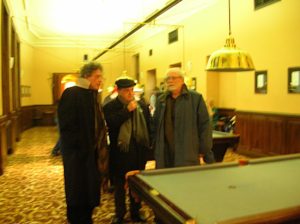
Czech PEN 80th Anniversary in Louvre Cafe where PEN members met in 1925. L to R: Playwright Tom Stoppard, PEN Int’l President Jiří Gruša, Czech PEN President Jiří Stránský.
The next meeting I attended that winter on February 15, 2005 celebrated the 80-year anniversary of Czech PEN. In Prague Jiří and I toasted the endurance of his PEN Center which had been founded by Karel Čapek and 37 Czech writers on that day in 1925. Czech PEN had survived the Second World War, the Cold War, the Soviet occupation and finally the liberation. Former prisoner, playwright and PEN member Václav Havel had become President of the country and his good friend and also prisoner Jiří Gruša was now President of International PEN. Under the auspices of the Minister of Culture, we met with Havel and playwright Tom Stoppard, himself Czech, and Jiří Stránský, President of Czech PEN at the Louvre Café where the original PEN gathering had taken place. Later, the Mayor of Prague hosted a reception with Czech PEN members in the Old Town Hall where he opened an exhibition celebrating “Eighty Years of the Czech PEN Club.”
The following week Writers in Prison Director (WIPC) Sara Whyatt and I traveled to the city of Stavanger, Norway which sat on the sea with a harbor and ships at dock. The Stavanger meeting brought together PEN and members of the now disbanded International Parliament of Writers, an organization founded after the fatwa against Salman Rushdie. The Parliament of Writers had developed a program to house writers in cities of asylum, but the Parliament of Writers no longer functioned. Many of the cities, however, still wanted to continue their hospitality for writers at risk. Stavanger itself hosted writers, including poet and novelist Chenjerai Hove, who’d been president of Zimbabwe PEN until he’d had to flee the government of Robert Mugabe. Hove was a fellow at the House of Culture in Stavanger until he passed away in 2015.
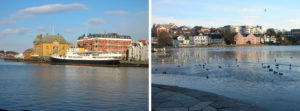
Stavanger, Norway, February, 2005 setting for birth of International Cities of Refuge Network (ICORN)
Helge Lunde, director of the Stavanger International Festival of Literature and Freedom of Speech convened PEN, representatives from the old Parliament of Writers and representatives from some of the cities that wanted to continue the program. In a several day meeting, the outlines of what would become the International Cities of Refuge Network (ICORN) were laid down with PEN as the vetting organization for applications and also a source of hospitality when writers arrived in their new temporary homes. ICORN remains active today in partnership with PEN in over 70 cities which promote and protect freedom of expression and host writers and artists at risk by providing housing, an income, literary arenas, scholarships and grants. PEN’s Writers in Prison Committee and ICORN regularly hold biennial meetings together.
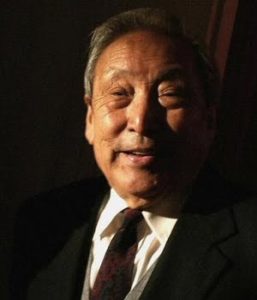
Writer Liu Binyan, a founder and first President, Independent Chinese PEN Center
The following weekend at Princeton University the relatively new Independent Chinese PEN Center (ICPC), founded in 2001, honored Liu Binyan, one of its founders and first President. ICPC’s members live both in China and abroad. The PEN Center gave them the ability to talk with each other and hold programs together, often in Hong Kong. Because of his writing and criticism of the Chinese Communist Party, especially after Tiananmen Square, Liu Binyan had not been allowed to return to China after an academic stay in the U.S. Though he never saw China again, in the U.S. he wrote and worked as Director of Princeton University’s China Initiative. (Nobel Laureate Liu Xiaobo was also a founder of ICPC and its second president.) At the dinner at the Princeton Faculty Club, ICPC members and China scholars presented Liu Binyan the book Living in Exile, written by distinguished essayists in China and abroad and dedicated to Liu who had spent considerable time in detention and in and out of labor camps. Later that year Liu Binyan passed away at his home in New Jersey.
In March “The International PEN Diyarbakir Seminar on Cultural Diversity” convened the largest and most ambitious conference that quarter in the primarily Kurdish southeast of Turkey. For years the Writers in Prison Committee had focused on cases in this dangerous region where fighting between the Kurdistan Workers Party (PKK) and the Turkish military had resulted in multiple imprisonments and killings. However, a rapprochement appeared to be expanding between the government and Kurdish citizens. In this space, PEN International had been working with Kurdish PEN and Turkish PEN to prepare this historic meeting of the two centers, along with PEN’s leadership of the Translation and Linguistic Rights Committee (TLRC). For the first time Kurdish writers and Turkish writers would speak side by side from the same stage in Kurdish and Turkish with translations of each language.
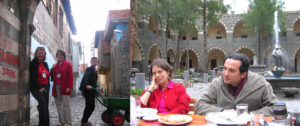
Diyarbakir, Turkey, March 2005. L to R: Joanne Leedom-Ackerman (PEN International Secretary), Jane Spender (PEN International Program Director), Carles Torner (Vice Chair Translation and Linguistic Rights Committee).
My predecessor as International Secretary Terry Carlbom had been instrumental in the planning, and we all agreed he should continue as coordinator of the seminar. Seventy delegates from a dozen countries gathered in the ancient city of Diyarbakir/Ahmed for five days. Diyarbakir dated back at least 5000 years, one of the oldest cities in the ancient land of Mesopotamia between the Tigris and Euphrates Rivers. Later it was dominated by Persia and by Alexander the Great. Because of its strategic position, Diyarbakir’s sovereignty changed many times, was part of the Roman empire, later conquered by the Arabs in 639, by Tamerlane in 1394; the Ottomans conquered in 1515. Diyarbakir continued through cycles of battles for control.
Old Diyarbakir was a standard Roman town circled by a wall, the stones of which still stood. The black basalt wall was said to be second only to the Great Wall of China. Within the walls a labyrinth of cobbled streets and alleyways unfolded, leading to towers where we could see the rivers and gardens and the city’s mosques and street life below, where caravan travelers used to stop on the silk road.
Before the conference began, PEN International Program Director Jane Spender and I explored the twisting paths and shared black tea in a central plaza with Carles Torner, vice chair of the Translation and Linguistic Rights Committee. As an American whose national history extended back barely 400 years, this accumulation of history in the streets and walls and buildings was mind-bending. In stones, in ideas…where did history reside and how did it evolve?
On the first evening Diyarbakir’s Lord Mayor Osman Baydemir greeted us at the Town Hall for a Newroz (New Year’s) reception. I thanked him on behalf of PEN for all he and the city had done to support this seminar. “It is a treat for us to visit one of the world’s oldest cities, with a history that could occupy the imagination of a community of writers like us for years to come,” I said. “Central to the Charter and ethos of PEN is a celebration of the universal which binds us as human beings and of the diversity which distinguishes each individual—the specific history, language and culture. It is our challenge and our aspiration as writers and members of PEN to provide the forums where cultures don’t clash but communicate. That is what we hope to do here in Diyarbakir.”
The first full day of the seminar we spent at the Newroz Festival. Our delegation was seated in an honored place in the bleachers which turned out to be behind the mother of Abdullah Öcalan, one of the founders and leaders of the PKK who was currently in prison. On the grounds in front of us spread thousands/ hundreds of thousands—some said a million people—celebrating the Kurdish new year, a time that coincides with the March equinox. Terry Carlbom and I were soon escorted to the main stage where we stood looking out over a sea of people as far as we could see, many in colorful local dress. Because PEN is specifically a nonpartisan/nonpolitical organization, we felt some ambivalence at the appearance of being swept into the Kurdish cause; on the other hand, the experience was one I won’t forget. The day was celebratory without violence. If there were political speeches, they were not translated for us, and we were accompanied by our Turkish colleagues who also attended.
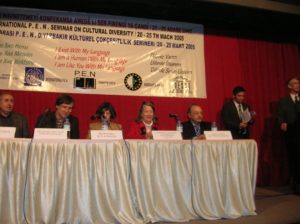
PEN Diyarbakir Conference on Cultural Diversity, 2005. L to R: Mehmed Uzun and Dr. Zaradachet Hajo (Kurdish PEN), Kata Kulavkova, (Chair, PEN Translation and Linguistic Rights Committee), Joanne Leedom-Ackerman, (PEN International Secretary), and Üstün Akmen, Turkish PEN
That evening in opening the conference, I noted, “In Diyarbakir/Ahmed this week we’ve come together to celebrate cultural diversity and explore the translation of literature from one language to another, especially to and from smaller languages. The seminars will focus on cultural diversity and dialogue, cultural diversity and peace, and language, and translation and the future. This progression implies that as one communicates and shares and translates, understanding may result, peace may become more likely and the future more secure.”
The official program began with the Lord Mayor and the President of Kurdish PEN Dr. Zaradachet Hajo and the President of Turkish PEN Mr. Üstün Akmen and a keynote speech by Kurdish author Mehmed Uzun. The following evening Turkish writer Murathan Mungan delivered an introductory address to a public gathering.
At the conference itself Kurdish and Turkish writers, poets, publishers and translators shared history and literature across their linguistic borders. Through discussion and readings and performances, they addressed the importance of cultural diversity as a value in a culture of peace.
Renowned Turkish/Kurdish novelist Yaşar Kemal, former president of Turkish PEN, had been invited but was ill and sent a message instead. He noted that the world was going through a difficult period and was faced with terrible destruction. He asked, “What makes human beings? Love, compassion, peace, friendship…Human beings are the only creative beings in the world.” Local cultures are being destroyed and with that is the destruction of languages and art and values, he said. In life and death we have to stand against a terrible destructive force in favor of local and national culture. “I believe your meeting will be successful,” he predicted.
Kata Kulavkova, Chair of the Translation and Linguistic Rights Committee emphasized the importance of the capacity to imagine, the importance of cultural memory and openness to dialogue. “Europe needs all identities, including Kurdish identities,” she said, noting that every culture is the center of the world for itself. “Turkish and Kurdish culture depend on each other to promote Turkish/Kurdish universal culture.”
Hüseyin Dozen of Kurdish PEN noted that literary translation helps a language to flourish; languages that are not standardized are enriched by literary translation which is an art rather than a scientific discipline. As far as languages that have no official status or have been prohibited, oral literature plays a central role, and the work of a translator must not neglect this kind of literature in his work.
PEN Vice President Lucina Kathmann led a discussion on “Bridging Borders” among women writers. Müge Sökmen of Turkish PEN moderated a discussion on Diversity and Literary Translation; Kurdish PEN member Berivan Dosky moderated a discussion on Cultural Diversity and Peace; Turkish PEN’s Vecdi Sayar led the discussion on Cultural Diversity and Dialogue, and Aysu Erden of Turkish PEN moderated a panel on Cultural Diversity and Linguistic Diversity.
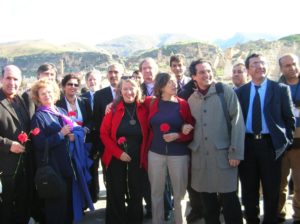
PEN trip to ancient town of Hasenkeyf, Turkey, 2005 including PEN International and Turkish and Kurdish members
One of the highlights of the conference was a visit to Hasankeyf, reputed to be the oldest continuing settlement on the planet and a cradle of civilization. Built into the sandstone cliffs in southeast Turkey, Hasankeyf had yielded relics that dated the site even earlier than the 12,000 years recorded, perhaps as old as 15,000 years. This Kurdish town of southeast Anatolia was threatened by a dam the Turkish government planned to build on the Tigris River. The Ilisu Dam would drown the town as the water was diverted and eventually would submerge Hasankeyf under as much as 400 feet of water.
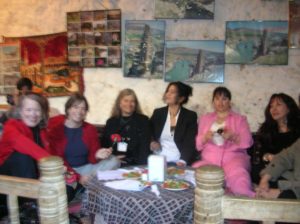
Lunch in a cave in Hasenkeyf, 2005, including PEN International representatives Joanne Leedom-Ackerman, Jane Spender and Lucina Kathmann
As we journeyed up the stone steps to the ruins of Hasankeyf Castle and later as we ate lunch in a cave, then bought small souvenirs from children who lived in the town, our delegation fell in love with the setting and the people. Several of us returned home and began writing about Hasankeyf in an effort to preserve its heritage. We were not alone. Worldwide protests to save this ancient site had been lodged, and the dam had been delayed. I set a google alert so that every time there was mention of the Ilisu Dam, I would know. Lucina Kathmann and I began exchanging latest news.
In spite of worldwide protests, the giant Ilisu Dam was completed after many delays in July, 2019. It began to fill its reservoir, tapping water from the Tigris River and diverting it from Iraq. The rising water levels are now slowly submerging the town of Hasankeyf, flooding the area which had been settled for millennia. The population for the most part has had to move. The waters have risen 15 meters and continue to rise around 15 centimeters per day, according to a February report by Reuters.
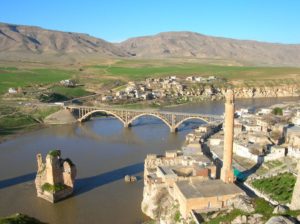
Hasenkeyf, Turkey, March 2005 during PEN Conference on Cultural Diversity, before the Ilisu Dam flooded the region.
Turkey’s rapprochement with the Kurds has also taken a turn away from the opening and the cultural diversity we celebrated in the 2005 Diyarbakir Seminar. But literature was exchanged there; friendships were made, and the dialogue among PEN members continues. Individual by individual has always been the strength and the modus operandi of PEN.
Next Installment: PEN Journey 35: Turkey Again: Global Right to Free Expression
PEN Journey 12: Tolerance on the Horizon?
PEN International celebrates its Centenary in 2021. I’ve been active in PEN for more than 30 years in various positions and now as an International Vice President Emeritus. With memories stirring and file drawers of documents and correspondence bulging, I am a bit of a walking archive and have been asked by PEN International to write down memories. I hope this personal PEN journey might be of interest.
It was a time of hope, the year when Nelson Mandela and Frederik de Klerk joined in free elections in South Africa, when Yasser Arafat, Yitzhak Rabin and Shimon Peres shook hands and began to live side by side, when the Irish Republican Army and the Ulster Defense Association laid down their arms after twenty-five years of terrorist conflict. The idea of tolerance quivered in the imagination in 1994 even if the realization of tolerant societies still seemed an imaginative leap.
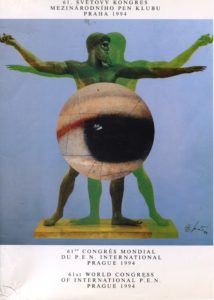
As theme of the 61st PEN Congress, tolerance also challenged the ethnic, national and religious intolerance that gripped dozens of countries in the last decade of the twentieth century. In retrospect the time was perhaps not so different from times since, but we felt we were standing on an historic threshold. The PEN Congress theme of tolerance expressed this hope and optimism.
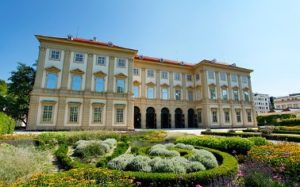
Liechtenstein Palace, garden view
Writers from over 75 PEN centers* around the world came together in Prague that fall for literary and working sessions. The Congress was a grand affair with public gatherings in stately ballrooms, including the Liechtenstein Palace, home of the Prague Academy of Music. Writers who had been imprisoned under the old Soviet regime, including Václav Havel, now ran the country.
Guests of honor included novelist and poet Taslima Nasrin, whom PEN had recently helped extract from the threat of death in Bangladesh (see PEN Journey 11). For protection she was driven around in a state car, and because Sara Whyatt, coordinator of the PEN’s Writers in Prison Committee (WiPC), and I agreed to look after her, we at times found ourselves whisked from meeting to meeting with a police escort, not the usual transport at a PEN Congress.
Though PEN had no mechanisms to change societies, to the extent society changed individual by individual, PEN worked for the writer, turning a spotlight on cases of abuse and challenging the laws which legitimized intolerance.
The voice of the individual writer has always been the most compelling testimony. My report to the Assembly of Delegates that year as Chair of the Writers in Prison Committee focused on those voices:
“Yes, I can hear birds singing. But they are not my friends. They are too far from me. My best friends are spiders and mantis. They are only living things to watch amusedly in my solitary cell. I live and play with them all day long. This excerpt is from a prisoner ten years into a twenty-year sentence written to his PEN minder.
“The image of the spider recurs in the writings of prisoners. One former prisoner I met shortly after taking over as Chair of this committee had come to London to receive treatment for the torture he’d endured. He told of being handcuffed to a generator outside during monsoon season, of not being allowed to wash, using a bucket as a toilet, his arms and hands wrapped around the generator for weeks. Then he talked about being inside in solitary confinement. ‘I had a chance to observe nature: rats, cockroaches, spiders,’ he recalled. ‘Ah, spiders, they are brilliant!’
“Cuban writer Yndamiro Restano, who was arrested in 1991 and sentenced to ten years in prison for preparing and distributing counter-revolutionary propaganda, has written a poem entitled Prison:
Mother,
Do you know where your poet is?
Well, they have dragged me into a dark,
Narrow, lonely cell,
And do you know why,
Mother?
For not allowing fear to carry me away.
But I am not completely alone,
Mother.
I have got to know a good friend here.
A small spider visits me every day
And spins in the door of my cell.
When the guard comes,
I let it know so it hides away.
And doesn’t get killed.
I want it to live,
Mother,
Because I know that it has inside it
Something that I also possess.
However,
It seems that the guard does not know this.
Mother,
Do you know where your poet is?
Well, they have dragged me to a cold,
Narrow, lonely cell.
And do you know why,
Mother?
Because the poet is the only person
Who never forgets
The meaning of freedom.
“The quality the spider has inside so like the writer is the ability to survive, to weave and to work wherever it is. The more difficult the circumstances, the more ingenious the web it weaves. Scientists are in fact currently studying the unique structure of the spider’s silk which gives it the tensile strength of a steel fiber, yet allows it to stretch and rebound from at least ten times its original length, something no metal or synthetic fiber can do.
“The writer’s silk, his tensile yet flexible fiber, is his imagination. It is the imagination and the life of the mind that allows the writers for whom the Writers in Prison Committee works to survive what are sometimes quite desperate physical conditions. One quality that gives the imagination its greatest flexibility and strength is tolerance, the theme of this Congress. It also is that quality and the ability to imagine and empathize with another’s life that prompts those not in prison or under attack to work on behalf of their fellow writers.
“The work of PEN members and Centers in 1994 has been inspiring even if the situation for the writers has been very difficult in many areas of the world. This past year has witnessed some remarkable moves towards tolerance: in South Africa with the first free elections, in Israel and the West Bank with the Israeli-Palestinian peace accord. The WiPC case load has declined with release of political prisoners in these areas, but writers remain in the line of fire and are still targets of those who are trying to disrupt the peace process.
“The past year over 120 writers have been released from prison. Unfortunately many times that number have been arrested, threatened and killed.
“Religion, ethnic and nationalistic tolerance has led to attacks and detention of writers in every area of the world. Religious intolerance of one kind or another continues to undermine intellectual freedom in Iran, Iraq, Pakistan, Bangladesh, Mauritius, Sudan, Egypt, Vietnam and Algeria.
“Often religion is used to justify political interests. No place has the confrontation between “religious” and state power been more devastating than in Algeria, where over 25 writers and journalists have been killed and dozens detained in the past two years.
“Ethnic, national and religious intolerance often merge as in the former Yugoslavia and other areas of the Balkans.
“The most brutal outbreak of ethnic intolerance globally this year has been in Rwanda, where over 37 writers and journalists have been killed, most targeted for their ethnic, and thus political background.
“Ethnic conflict, which is also political conflict, currently stirs in Nigeria where Ken Saro Wiwa, advocate for the Ogoni people, is in jail and reportedly tortured and in Kenya where Koigi wa Wamwere exposed “ethnic cleansing” in the Rift Valley and has been detained on charges which carry the death penalty.
“The most difficult country with the largest number of Writers in Prison Committee cases continues to be Turkey where those discussing and debating the Kurdish situation in the Southeast are charged with “disseminating separatist propaganda” under Article 8 of the Anti-Terror Law and are imprisoned. Killings and torture are reported by both sides of this conflict. PEN records over 250 cases in Turkey.
“The other country which continues to lead our list with the most main cases is China where over 45 writers, a third of these in Tibet, are imprisoned. Though China has released some prominent dissidents this year, the Chinese authorities have also arrested at least twice as many writers as they have released…”
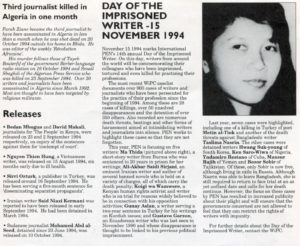
From PEN’s Centre to Centre newsletter October/November, 1994.
The Chair’s report for 1994 notes progress but also shows how little has changed for writers in the past 25 years in many areas of the world such as Turkey and China though there has been progress in Algeria, Rwanda, the Balkans, Nigeria and Kenya. The Day of the Imprisoned Writer campaign in November, 1994, noted in the newsletter above, focused on five writers. Of these Ma Thida was released and eventually started a Myanmar/Burma PEN Center and now serves on the PEN International Board; Koigi wa Wamwere was released and is a celebrated Kenyan writer. Gunay Aslan and Gustavo Garzon, also released, continue to create. Ali-Akbar Sa’idi Sirjani died in Iranian prison under mysterious circumstances in November 25, 1994.
With attention and advocacy, circumstances improve for individual writers, but many writers who are released have to go into exile. At the Prague Congress PEN began to expand its thinking and resources to develop services for exiled writers. (Future blog post.)
A highlight of the 61st Congress was the address by Czech President Václav Havel, fellow writer and playwright whose first play “Garden Party” lampooned the communist system in 1963. In 1969 he was barred from his job as a writer/editor after the suppression of the Prague Spring reforms in 1968, and he was forced to work as a manual laborer. In 1977 he became the spokesman for the Charter 77 dissident group that criticized the communist officials and was given a suspended sentence of 14 months. After publishing in 1978 “Power of the Powerless” which was an analysis of how a totalitarian regime kept power by corrupting and manipulating citizens, he was sentenced to four and a half years in prison for “subversion” against the state. During this time PEN worked actively on his case, pressuring diplomats around the world. Havel was released after three and a half years but then imprisoned again after meeting dissidents and the French President in Prague in 1989. Havel was sentenced to nine months, but widespread protests from home and abroad, many generated by PEN, brought his release in May. In November, 1989 the communist regime fell. In December 1989 Václav Havel was elected President of Czechoslovakia, which eventually split. At the time of the PEN Congress he was in his first year as President of the newly independent Czech Republic.
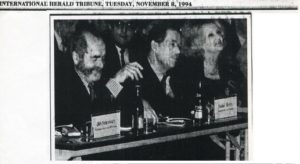
Left to right: Jiří Stránský, President Czech PEN, and Czech President Václav Havel
Abridged speech of Václav Havel to the Opening of the 61st PEN Congress in Prague November 7, 1994:
“Several times in my life I have had the honour of being invited to a world congress of the International PEN Club. But the regime always made it impossible for me to attend. I had to live to the age of fifty-eight, go through a revolution in my country, become the nation’s president, and see the World Congress held in Prague, to be able to participate in this important event for the first time in my life. I am sure you will understand therefore, that this is a very moving moment for me.
“Yes, we live in a remarkable time. It is not just that we now learn, almost instantaneously, about all the deeply shocking atrocities that take place in the world; it is also a time when every local conflict has the potential to divide the international community and become the catalyst for a far wider conflict, one that in many cases is even global. Who among us, for instance, can tell where the present war in Bosnia and Herzegovina may lead, to what tragic confrontation of three spheres of civilization, if the democratic world remains as indifferent to that conflict as it has so far?
“I think that in these matters, writers and intellectuals can and must play a role that only they can fill. They are people whose profession, indeed, whose very vocation is to perceive far more profoundly than others the general context of things, to feel a general sense of responsibility for the world, and to articulate publicly this inner experience.
“To achieve this, they have essentially two instruments available to them.
“The first is the very substance of their work—that is, literature, or simply writing. Deep analysis of the tangled roots of intolerance in our individual and collective unconsciousness and consciousness, a merciless examination of all the frustrations of loneliness, personal inadequacies and the loss of metaphysical certainties that is one of the sources of human aggression—quite simply, a sharp light thrown on the misery of the contemporary human soul—this is, I think, the most important thing writers can do. In any case, there is nothing new in this: they have always done that, and there is no reason why they should not go on doing so…
“But there is another instrument, an instrument that intellectuals sometimes avail themselves of here and there, though not nearly often enough in my opinion. This other instrument is the public activity of intellectuals as citizens, when they engage in politics in the broadest sense of the word. Let us admit that most of us writers feel an essential aversion to politics. We see entering politics as a betrayal of our independence, and we reject it on the grounds that the job of the writer is simply to write. By taking such a position, however, we accept the perverted principle of specialization, according to which some are paid to write about the horrors of the world and human responsibility, and others to deal with those horrors and bear the human responsibility for them. It is the principle of a rather doubtful division of labour: some are here to understand the world and morality, without having to intervene in that world and turn morality into action; others are here to intervene in the world and behave morally without being bound in any way to understand any of it…
“In short, I am convinced that the world of today with so many threats to its civilization and so little capacity to deal with them, is crying out for people who have understood something of that world and know what to do about it to play far more vigorous role in politics. I felt this when I was an independent writer, and my time in politics has only confirmed the rightness of that feeling, because it has showed me how little there is in world politics of the mind-set that makes it possible to look further than the borders of one’s own electoral district and its monetary moods, or beyond the next election.
“I am not suggesting, dear colleagues, that you all become presidents in your own countries, or that each of you go out and start a political party. It would, however, be wonderful if you were to do something else, something less conspicuous, but perhaps more important: that is, if you would gradually begin to create something like a world-wide lobby, a special brotherhood or, if I may use the word, a somewhat conspiratorial mafia whose aim is not just to write marvelous books or occasional manifests, but to have an impact on politics and its human perceptions in a spirit of solidarity, and in a coordinated, deliberate way…”
“Let me conclude with one final plea: do not fail to raise your common voice in defence of our colleague and friend Salman Rushdie, who is still the target of a lethal arrow, and in defence of Nobel Laureate Wole Soyinka, who is unable to join us here because his government prevented him from coming. I also beg you to express our common solidarity with all Bosnian intellectuals who have been waging a courageous and unequal struggle on the cultural front with the criminal fanaticism of the ethnic cleansers, those living examples of the lengths to which human intolerance can eventually go.”
Next Installment: PEN Journey 13: PEN and the U.N in a Changing World
*Delegates representing 73 PEN Centers attended the 61st Congress, along with observers from three proposed new centers—Malawi, Guadalajara and Iranian Exiles Abroad. All three were elected as new PEN centers at the Congress, along with new centers in Ghana and Kyrgyzstan and a revived Egyptian PEN center.
PEN Journey 11: Death and Its Threat: the Ultimate Censor
PEN International celebrates its Centenary in 2021. I’ve been active in PEN for more than 30 years in various positions and now as an International Vice President Emeritus. With memories stirring and file drawers of documents and correspondence bulging, I am a bit of a walking archive and have been asked by PEN International to write down memories. I hope this personal PEN journey might be of interest.
In Bangladesh novelist Taslima Nasrin was in hiding. Death threats had been issued, a price put on her life. On the streets of Dhaka and other cities, crowds threatened to hang her because of her words in a newspaper challenging the Koran and Islamic laws and because of her novel Lajja (Shame) which depicted Muslim atrocities on Hindus after a mosque’s destruction in Ayodhya, India.
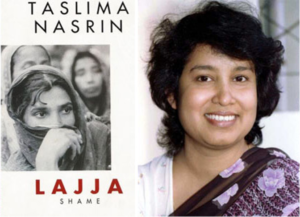
The time was summer, 1994. In London Sara Whyatt, PEN’s Writers in Prison Committee Coordinator, and I sat in a Kensington hotel restaurant waiting to meet a man who’d called the office and said he was Taslima’s brother and wanted to talk with us. PEN had been actively working on Taslima’s case for the past year, sending out Rapid Action Alerts, meeting with Bangladeshi government officials in London and in the U.S. and Europe, calling on the government to protect her. The case had gained international attention. Given recent violence around fatwas, including those on Salman Rushdie, we were wary. We didn’t know Taslima had a brother. We spoke with MI5 who advised us to have a spotter for the meeting. We arranged a tell so that if the encounter was not legitimate or we perceived trouble, I would take my sunglasses from the top of my head and set them on the table. The spotter—PEN’s bookkeeper—sat at another table and could quickly summon help. We weren’t certain, but we thought MI5 was also in the hotel.
In retrospect the drama around Taslima’s case seems inflated, but during that period of 1993-1994 the situation had escalated to the point that religious leaders were warning that the government would be overthrown if Nasrin was not arrested. In June, 1994 when an arrest warrant was issued, Taslima went into hiding. A nationwide hunt was launched, and snake charmers carrying poisonous snakes marched in Dhaka and warned that thousands of snakes would be let loose if Nasrin was not arrested by June 30.
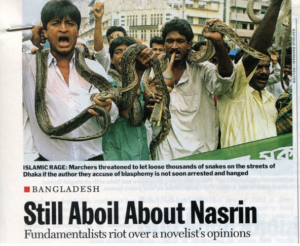
Time, July 11, 1994. Photo by Rafique Rahman-Reuters
In this atmosphere PEN had received the call from Taslima’s older brother. International PEN’s Writers in Prison Committee and PEN’s Women’s Committee, in particular its chair Meredith Tax in New York, had been in touch with Taslima and her lawyers, but in the time of faxes, (now fading), inconsistent telephone connections, and no internet between writers, no one had yet confirmed a brother coming through London. This kind of high drama was not PEN’s usual modus operandi. In the years I chaired PEN’s Writers in Prison Committee (1993-1997), more than 900 writers threatened, detained, in prison, and killed came across PEN’s desk annually. Approximately a quarter of these were designated main cases which meant PEN had sufficient information to verify the situations and had members to work on the writer’s behalf. However, only a few became global causes like Taslima’s, gathering energy, attention and advocates around the world. This usually happened when the threat of death was credible and immanent and when the circumstances of the writer connected to larger issues.
That day in London, a man in his thirties approached our table. He looked so much like pictures of Taslima that we quickly set aside our suspicions. He worked for an airline and was passing through London. He was able to answer questions and confirm details of the case such as what Taslima had actually said to the newspaper which had misquoted her calling for revision of the Koran. I still have my notes from that meeting. Her brother explained that Taslima had said she wanted to modify Sharia laws, not the Koran. “I want men and women to be equal,” she’d said. She was charged with blasphemy under a law left on the books by the British.
Her brother told us that her lawyer was afraid. The lawyer couldn’t move for bail unless Taslima was present, but if the government didn’t give security for her, they couldn’t take the risk of Taslima coming to court. The government said if Nasrin went to court, anything could happen in court or in jail. In jail she could be killed. Her father’s home had been attacked, and he was now under protection.
Her brother confirmed that Taslima had finally agreed that she needed to leave Bangladesh though she was reluctant. “If I go from Bangladesh, who can write about these poor women?” she asked. And yet she wasn’t able to write anything now, he said, and her life was not safe if she stayed.
Her trial date had been set for Aug. 4. If she didn’t appear, the government would seize her things, including her passport, which they had taken away before but had returned when she resigned her post as a doctor. She was a medical doctor as well as writer.
Her brother’s message to us that day was: “Save my sister!”
Through discussions with her lawyer, with selected PEN members and with the Bangladeshi courts, it was finally arranged that Taslima would turn herself in late in the evening. Bail would be set and met, and in disguise she would leave the court. The president of Swedish PEN flew to Dhaka and accompanied her in a flight to Sweden, where she lived for years in exile.
It was lonely in exile. I met with Taslima in early September 1994, a few weeks after her arrival in Stockholm. I have notes from those meetings. “One day I’ll go back,” she said, “but I don’t know if I could live in my country anymore. I don’t know what will happen. I want to live in Bengal, but they will kill me. I couldn’t take my writing out.”
She explained that she was from a Muslim family with Hindus as her neighbors. “From the beginning I went to their houses, played with them. I know their culture, attitudes. I know their happiness and sorrow from childhood. It is not difficult for me to reach them.” After the violent incidents in Ayodhya, India where Hindu women were raped and their homes looted, she said, “I felt them. I have felt the danger and had to write for them…Why can’t I write a book in reverse, but they feel they should write my book in the case like Lajja…In India, Hindus can’t feel Muslim, and Muslims can’t feel Hindu…In Bengal, Hindu and Muslim live separately…People think men are superior to women. Women always get advice from men. Mothers are always kept quiet. It is not allowed for a mother to give advice to a son.”
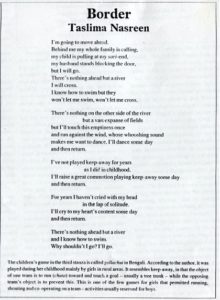
London Review of Books, September 8, 1994
At the time and in retrospect at PEN we questioned whether any of our actions escalated the situation for Taslima’s case. This was the Bangladeshi government’s argument, but Amnesty and numerous human rights and freedom of expression organizations also highlighted her situation. Through IFEX, the International Freedom of Expression Exchange of which PEN was a founding member, reports circulated worldwide. The fact was, Taslima Nasrin was in real danger. PEN went into action and helped with her extraction.
In November 1994 Taslima was a special guest at the 61st PEN International Congress in Prague, opened by Vaclav Havel as the keynote speaker. In December that year she received the prestigious Sakharov Prize for Freedom of Thought, given by the European Parliament.
Though Taslima’s case was the most celebrated at the time, there were numbers of other writers and women under threat because of their writing. In a town in Northern Greece Anastasia Karakasidou had received anonymous letters threatening to rape and kill her in front of her children because of her scholarly dissertation on the ethnic Slav population in that region. In Algeria another woman writer stayed in her house afraid even to go out on the street because her words challenged both government and fundamentalists’ violent policies. She had not received a direct death threat, but she was a well-known and recognized writer in a country where more writers had been killed in that past year than in almost any other, including Somalia, Angola and the former Yugoslavia.
Death was the ultimate censor, and the threat of death was its chilling companion. International PEN’s Writers in Prison casebook at the time listed at least 22 countries where writers were under death threats. In four countries the writers had gone into hiding. Death threats also prompted self-censorship for many writers. Most of the threats did not come directly from governments but from individuals who professed to be offended by the writer’s words. The offense, however, was almost always tied to a political or religious position, and the writer’s life became a political, not a moral, consideration.
While issues of communal violence and religious and political Islam differed from the rights of ethnic minorities in Northern Greece or from political probity in Argentina, Guatemala, Peru, Paraguay where PEN listed high numbers of death threats, the common need in all these cases was for the government to protect the writers and take action against those who issued the threats.
Next Installment: PEN Journey 12: Tolerance on the Horizon?
PEN Journey 10: WiPC: Beware of Principles
PEN International celebrates its Centenary in 2021. I’ve been active in PEN for more than 30 years in various positions and now as an International Vice President Emeritus. With memories stirring and file drawers of documents and correspondence bulging, I am a bit of a walking archive and have been asked by PEN International to write down memories. I hope this personal PEN journey might be of interest.
In the summer of 1993 before taking over the Chair of PEN International’s Writers in Prison Committee I studied hundreds of individual cases on PEN’s list of over 900 cases which was published twice a year. I studied the regions of the world where conflict was rife, where governments were most oppressive and where writers were most threatened. I also used the time to conceive three long term projects because I knew when the job began, there would be less time for long term thinking.
First, I hoped we could gather the many poems and stories from imprisoned writers over the years and get these published into a book. In studying the cases, I came to understand that those who survived harrowing experiences were often those able to keep their imaginations alive and if possible were able to write. “We lived in Paris in our minds,” one prisoner in dire conditions inside the Western Sahara recounted. A book of these writings would celebrate and inspire and could also be used by PEN centers in their work.
Second, I wanted to convene the Writers in Prison Committees from around the world in a conference to strategize our work. PEN’s other standing committees had such meetings outside of the congresses, but WiPC never had. The PEN congresses were often filled with competing programs and those working on WiPC issues were not always the delegates. We needed to gather and plan together for several days.
Finally, I hoped to expand the roster of Writers in Prison Committees in the PEN Centers so that we could increase the number of members working and the number of writers on whose behalf we worked.
WiPC Coordinator Sara Whyatt and researcher Mandy Garner and I agreed on each of these goals. Every two weeks we met in the large airy WiPC office at the top of the Charterhouse Buildings in London or often at the tea shop across the alley. At the end of our strategy sessions we would discuss how to move forward the longer range goals. I learned an important lesson—first, a goal begins with an idea then is realized by having talented, committed people around. For me that began with Sara and Mandy, who set steps in motion. And then each project found a path forward as people arrived into our circle to help accomplish the tasks.
One day a publisher showed up in our office and asked if we had ever considered doing a book of prisoners’ writings. As a matter of fact…We quickly outlined our idea, put together a team with former WiPC coordinator Siobhan Dowd as editor, and a year and a half later in 1996 This Prison Where I Live was on book stands with selections from more than 65 writers who had been imprisoned, many of whose cases PEN had worked on, from Arthur Koestler to Cesar Vallejo, Alexander Solzhenitsyn, Jacobo Timerman, Breyten Breytenbach, Pramoedya Ananta Toer, Primo Levi, Wole Soyinka, Vaclav Havel, Ngugi wa Thiong’o, Nazim Hikmet, Ken Saro-Wiwa, and many others, current and former writers in prison.
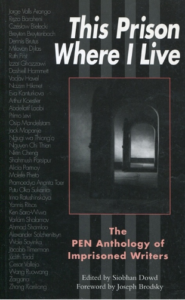
From This Prison Where I Live:
You took away all the oceans and all the room.
You gave me my shoe-size with bars around it.
Where did it get you? Nowhere.
You left me my lips, and they shape words, even in silence.
—Osip Mandelstam, former USSR, 1935
When we shared our second hope for a global gathering, Danish PEN offered to host the conference in Helsingor, the home of Hamlet. With representatives of PEN centers on every continent, this first WiPC conference convened in the spring of 1996. The WiPC gathering has been held biennially ever since at locations around the world. (More on this conference in a later post.)
Regarding the third goal, the number of PEN centers with Writers in Prison Committees has grown each year because of PEN members around the globe. Unfortunately, the number of cases of writers threatened, imprisoned or killed has also continued to grow, but individual cases are released.
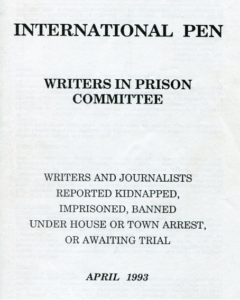
In that summer preparing to take over the Chair, my predecessor and mentor Thomas von Vegesack gave me advice I found puzzling at first. He invoked: “Beware of principles!” Thomas was an empathetic and principled man so I was perplexed by his counsel, but over the years I’ve come to understand what he meant. He meant that declarations and statements can often keep you from seeing a way forward and from understanding how to work on a case if you get tangled in abstractions.
There are of course principles that govern our work enshrined in the Universal Declaration of Human Rights. These are fundamental, but Thomas was warning that it is important to understand each situation and not let rigidity, a kind of authoritarianism of principles or political correctness limit.
PEN’s Charter itself contains contradictory concepts. The Charter asserts that PEN members should “use what influence they have in favour of good understanding and mutual respect between nations and people; they pledge themselves to do their utmost to dispel all hatreds and to champion the ideal of one humanity living in peace and equality in one world.”
At the same time the Charter notes that “PEN stands for the principle of unhampered transmission of thought within each nation and between all nations, and members pledge themselves to oppose any form of suppression of freedom of expression in the country and community to which they belong…”
These two ideas of respect and freedom of expression have been challenged more than once, a decade ago in the case of the Danish cartoons. (More on this in a future post.)
Ultimately each PEN member has to resolve the inherent tension. Those from societies with longer democratic traditions are more accustomed to balancing competing ideas; but there are no certain answers. PEN has had lengthy discussions and debates on such questions as “hate speech”—what constitutes it, are there limits to freedom of expression—on slander and libel, holocaust denial, blasphemy.
These challenges for PEN are manifested in individual cases. Early in my tenure as Writers in Prison Chair, one such case blew up quickly, gathering headlines across the globe—the case of Bangladeshi writer Taslima Nasrin. Dr. Nasrin (she was a medical doctor turned writer) had written a novel Lajja (Shame) which described the Muslim backlash against Bangladesh’s Hindu minority after the destruction of a mosque. She was also quoted (misquoted, she said) suggesting that the Koran should be revised in favor of women. An arrest warrant was issued for her; demonstrators called for her death, and at one point snake charmers in Dhaka threatened to release their cobras into the streets if she wasn’t executed. PEN’s Writers in Prison Committee and PEN’s Women’s Committee took up the case, which had bizarre twists along the way.
Next Installment: PEN Journey 11: Death and Its Threat: The Ultimate Censor
PEN Journey 6: Freedom and Beyond…War on the Horizon
PEN International celebrates its Centenary in 2021. I’ve been active in PEN for more than 30 years in various positions and now as an International Vice President Emeritus. With memories stirring and file drawers of documents and correspondence bulging, I am a walking archive and have been asked by PEN International to write down memories. I hope this personal PEN journey is of some interest.
PEN members played key roles in the shifting landscape of Europe in the early 1990’s as the Berlin Wall fell, and the East moved closer to the West. Playwright and PEN member Vaclav Havel, who spent multiple stays in prison for his opposition and activism against the Communist regime, was elected President of Czechoslovakia in December, 1989. Czech writers Jiri Stransky and Jiri Grusa, both of whom spent time in jail under the Communists, later worked with Havel. Jiri Stransky became President of Czech PEN, and Jiri Grusa worked in the Ministry of Foreign Affairs and later was elected President of PEN International in 2003. Dissident Hungarian writer Arpad Goncz, whose name was on the program of the 55th PEN Congress as a member of the Hungarian delegation, was prevented from coming because on the day he was to depart, he was elected President of Hungary.
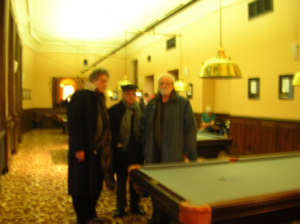
Czech PEN members playwright Tom Stoppard, Jiri Grusa (President of PEN International) and Jiri Stransky (Czech PEN President) at historic restaurant in Prague in 2005
At PEN’s 55th Congress in Madeira, Portugal May,1990, Hungarian novelist Gyorgy Konrad was elected President of International PEN after the unexpected death of President Rene Tavernier. According to the interim and past President Per Wastberg, Konrad had been “very active in the spiritual liberation not only of his own country, Hungary, but of Eastern and Central Europe.”
Konrad told the Assembly of Delegates, “It had been the spirit of human rights, which corresponded with the main interest of the freedom of the mind and of literature, which had been the motive force in recent events in Eastern Europe so that it had been the spirit, rather the physical force, which had caused the shifts in power.” [But] “liberated from the uneasy situation of the censorship of the one-party system, writers there were facing a new sort of danger, the danger of conflicts between nationalities spurred on by national chauvinism. If it was possible to find understanding between writers in that very disturbed part of Europe, maybe it would also be easier to find understanding between the governments and the peoples. Therefore the PEN Centers and their members could perhaps form the avantgarde of this understanding.”
The East German delegate noted it was “the writers, theatre people and artists of the GDR who had blown that trumpet and done a great deal to bring about the collapse [of the wall.] It was they who had called for a huge demonstration on 4th November, at which two million people had gone out onto the streets of East Berlin, demanding changes.” The GDR PEN Center had also “blown the trumpet much earlier when they had supported Vaclav Havel and demanded his release from prison, which, at that time—more than a year ago—had been a thing not without danger in the GDR,” he said.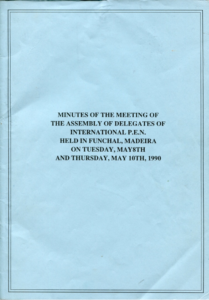
Yet the breaking up of the Communist regimes with their centralized authority was also leaving in the wake difficult conditions for many writers. Their publishers were closing, their livelihoods shrinking, and the West was taking over. “This did not mean that the writers of the GDR did not wholeheartedly go out onto the streets when they were called on to demonstrate for freedom of expression of writing, of thought and of travel,” the East German delegate said. But “now they had to take the harder road to freedom as Brecht had put it, with a proud bearing, even if they might lose in the process.”
The delegate from Poland saw two major problems ahead: “The first was political: the danger that the remnants of Stalinism might ally with the proponents of extreme right chauvinism. To overcome this danger it was necessary that the new democracies should be stabilized. The second problem was cultural: to find models for cultural life in their countries. They did have a very serious crisis in the domain of publication.”
Because of the collapse of currencies and income in these countries and the withdrawal of state support for arts and culture, it was increasingly difficult for the writers and PEN centers to pay their dues to International PEN and to find funds to travel to conferences and congresses. This situation also existed for many writers in Africa and Latin America where PEN had expanded its centers. In 1990 there were 96 PEN centers around the world.
At the Madeira Congress, PEN set up a Solidarity Fund to which countries with stronger currencies and income could contribute to assist their fellow members. The Assembly of Delegates formalized a procedure for a small, but broad-based committee to make these grant decisions. I was asked by the two American Centers to represent them on the committee, which also included representatives from Zimbabwe, Cote d’Ivoire, Polish, Soviet Russian, Canadian, English and French PEN Centers. Looking back, this new, more democratic process for dispersal of funds foreshadowed major change in PEN International’s own governing structure, change that was to come by the end of the decade.
“The collapse of the Berlin Wall…only provided an entry into the Promised Land…[but did not] overcome all the problems of coping with liberty for the first time,” reflected International Secretary Alexander Blokh to the Assembly of Delegates. “Now was the honeymoon period between East and West, but there was cause to fear that it might not last…While the trumpets of Jericho still sound in our ears, we should take steps to face up to these problems and iron out possible misunderstandings.” For this purpose PEN had held and was holding conferences in Vienna and Budapest with writers in the region.
The Congress discussion around the tectonic changes in Europe and the impact elsewhere occurred in idyllic Funchal, the capital city of Portugal’s Madeira archipelago, surrounded by hills, set on an expansive harbor with gardens and flowers everywhere. A cable car took delegates to the top of the island which offered sweeping views of the hillside neighborhoods and the town below. My specific memories are of bougainvilleas and the beauty of the setting, of the combined joy and worry of colleagues who used to emerge from the “Iron Curtain” to attend PEN gatherings, and now felt relief in their freedom but uncertainty about their lives and the future of their countries.
I remember specifically the establishment of the Solidarity Fund which operated in the 1990’s to help bridge the economic differences within PEN so that all centers could participate. PEN’s policy, though with exceptions, was that a center had to pay its dues in order to vote in the Assembly. Gilly Vincent, who later assisted the International PEN Foundation, remembers working late one winter’s night in the International PEN office when the doorbell rang. She went downstairs to find the Secretary of Polish PEN standing in the shadows at the front door. He had come to pay his Center’s dues in cash. She took the envelope and invited him in so that she could give him a receipt. He replied: “No. We carry no receipts” and vanished into the darkness, she recalls.
My memory of the Madeira Congress includes sharing meals with colleagues from Eastern Europe and with the Russian poet Yevgeny Yevtushenko, author of the famed Babi Yar who attended as a delegate from the new Soviet Russian PEN Center. [At the Vienna Congress a year later in November, 1991 the Soviet Russian PEN Center got approval to change its name to Russian PEN after the August coup where the Center had issued a statement “true to the best traditions of PEN”.] Yevtushenko, dressed as I recall in rather flamboyant clothes—all white suits (or were they all red or plaid?) commanded attention wherever he went. In the Assembly he spoke in support of a new Belarusian Center which he said would symbolize the democratization of the Soviet Union. He said its members would be helpful in the common fight on behalf of persecuted writers. He spoke in support of the Kurdish Writers Abroad Center changing its name to the Kurdish Center so that Kurdish Writers in Turkey wouldn’t be accused of “separatism” for joining it. And he supported PEN holding a conference in Alexandria, Egypt, where he said PEN must do everything possible to help Salman Rushdie and must ask Arab colleagues in Alexandria for support.
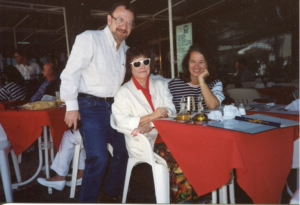
Richard Bray (PEN USA West Executive Director ), Carolyn See (PEN USA West President), and Joanne Leedom-Ackerman at the 55th PEN Congress in Madeira, Portugal
At the Writers in Prison Committee meetings and at the Assembly, PEN delegates also focused on the continuing crackdown in China, on the persecution of writers, editors and publishers in Turkey, Myanmar, Vietnam, Sudan, Cuba, and El Salvador. They protested the house arrest of the renowned novelist Pramoedya Ananta Toer in Indonesia. In May, 1990 PEN recorded 381 cases of writers in prison or banned. In spite of the changes in Eastern Europe, the numbers of persecuted writers had not declined worldwide, and there were still some cases in Central and Eastern Europe. PEN resolved to act in all these areas, but the seismic shift in the political landscape of Europe held the focus for the 55th Congress whose theme for the literary sessions was Language and Literatures: Unity and Diversity.
The breakdown of the Communist states was already leading to heightened nationalism, in no place more acutely than in the Republic of Yugoslavia. While most PEN members defended the move towards freer and more tolerant societies, there were some who espoused the nationalistic sentiments that led to the war which eventually broke out in the Balkans. A few took leadership roles in that conflict and separated from PEN which had centers in the former Yugoslav republics—Serbian PEN, Croatian PEN, and Slovene PEN. Only Slovene PEN attended the Madeira Congress. Slovene PEN had long been the annual host for PEN’s Peace Committee which met in Bled, Slovenia, an idyllic town on a lake where it was difficult to imagine war.
But war was on the horizon in the Balkans. What no one anticipated was that war was also on the horizon in the Middle East for in less than three months after the Madeira Congress, Iraq invaded Kuwait. By January, 1991 America and 39 other nations were at war with Iraq. The upcoming PEN Congress in Delphi, Greece had to be cancelled; the conference in Alexandria had already been cancelled at the Madeira Congress. Two months later, in March 1991 the first shots were fired in the Balkans in a war that would last four years.
Next Installment: PEN in Times of War and Women on the Move
PEN Journey 3: Walls About to Fall
PEN International celebrates its Centenary in 2021. I have been active in PEN for more than 30 years in various positions, including as Vice President, International Secretary and Chair of International PEN’S Writers in Prison Committee. With memories stirring and file drawers bulging, I am a bit of a walking archive and have been asked by PEN International to write down memories. In digestible portions I will recount moments and hope this personal PEN journey may be of interest.
Our delegation of two from PEN USA West—myself and Digby Diehl, the former president of the Center and former book editor of the Los Angeles Times—arrived in Maastricht, The Netherlands in May 1989 for the 53rd PEN International Congress. We joined delegates from 52 other centers of PEN around the world, including PEN America with its new President, fellow Texan Larry McMurtry and Meredith Tax, founder of what would soon be PEN America’s Women’s Committee and later PEN International’s Women’s Committee. Meredith and I had met at the New York Congress in 1986 where the only picture of the Congress on the front page of The New York Times showed Meredith and me in the background at a table taking down the women’s statement in answer to Norman Mailer’s assertion that there were not more women on the panels because they wanted “writers and intellectuals.” Betty Friedan argued in the foreground.
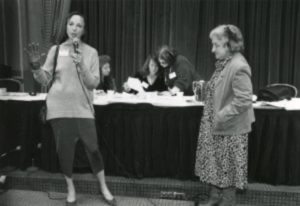
Front page of the New York Times, 1986. Foreground: left – Karen Kennerly, Executive Director of American PEN Center, right – Betty Friedan, Background: (L to R) Starry Krueger, Joanne Leedom-Ackerman, Meredith Tax.
Over the previous months the two American centers of PEN had operated in concert, mounting protests against the fatwa on Salman Rushdie and bringing to this Congress joint resolutions supporting writers in Czechoslovakia and Vietnam.
The theme of the Maastricht Congress—The End of Ideologies—in large part focused on the stirrings in Eastern Europe and the Soviet Union as the region poised for change no one yet entirely understood. A few weeks earlier, the Hungarian government had ordered the electricity in the barbed-wire fence along the Hungary-Austrian border be turned off. A week before the Congress, border guards began removing sections of the barrier, allowing Hungarian citizens to travel more easily into Austria. In the next months Hungarian citizens would rush through this opening to the West.
At PEN’s Congress delegates from Austria and Hungary sat a few rows apart, separated only by the alphabet among delegates from nine other Eastern bloc countries which had PEN Centers, including East Germany. This was my third Congress, and I was quickly understanding that PEN mirrored global politics where writers were on the front lines of ideas and frequently the first attacked or restricted. Writers also articulated ideas that could bring societies together.
In those days PEN had close ties with UNESCO, and attending a PEN Congress was like visiting a mini U.N. Assembly. Delegates sat at tables with name tags of their countries in front of them. Action was taken by resolutions which were debated and discussed and then sent to the International Secretariat and back to the Centers for implementation. At the time PEN operated with three standing Committees, the largest of which was the Writers in Prison Committee focused on human rights and freedom of expression. The other two were the Translation and Linguistic Rights Committee and the Peace Committee. Soon, in 1991, a fourth—the Women’s Committee—would be added. At parallel and separate sessions to the business of the Assembly of Delegates, literary sessions explored the theme of the Congress.
PEN USA West was particularly active in the Writers in Prison Committee (WiPC) where we advocated for our “adopted/honorary” members, most prominent for us at that moment was Wei Jingsheng in China. We had drafted and brought to the Congress a resolution, noting that China had recently released numbers of individuals imprisoned during the Democracy Movement, but Wei Jingsheng had not been among them and had not been heard from. We addressed an appeal to the People’s Republic of China to give information on the condition and whereabouts of Wei Jingsheng and to release him.
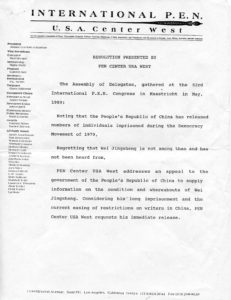
Before we spoke to this resolution on the floor of the Assembly, we met with the delegate of the China Center. The origins of this center was a bit of a mystery since it was one of the few centers that defended its government’s actions rather than PEN’s principles. I still recall the delegate with thick black hair, square face, stern visage and black horn-rimmed glasses, though this last detail may be an embellishment. He argued with me that Wei Jingsheng was an electrician, not a writer, that he had simply written graffiti on a wall, but that he had committed a crime by sharing “secrets” with western press.
The Chair of the Writers in Prison Committee Thomas von Vegesack, a Swedish publisher, arranged for the celebrated Chinese poet Bei Dao, a guest of the Congress, to speak in support of the PEN USA West resolution. The delegate from Taipei PEN stood next to Bei Dao and translated his words which contradicted the China delegate. Bei Dao noted that Wei Jingsheng had been in prison ten years already, having been arrested when he was 28-years-old. He had already published his autobiography and 20 articles and for years had been editor of the magazine SEARCH. In his posting on the Democracy Wall and in his essay “The Fifth Modernization,” Wei had suggested that democracy should be added as a fifth modernization to Deng Xiaoping’s four modernizations. “This shows that Wei Jingsheng’s status as a writer can’t be questioned,” Bei Dao said. I still remember that moment of Bei Dao addressing the Assembly and his country man with a Taiwanese writer translating. For me it demonstrated PEN in action.
In Beijing at that time thousands of students and citizens were protesting in Tiananmen Square.
PEN Center USA West’s resolution passed. The China Center and Shanghai Chinese Center refused to accept the resolution. The Maastricht Congress was the last PEN Congress they attended for over twenty years.
In the months preceding the gathering in Maastricht International PEN Secretary Alexander Blokh, International President Francis King and WiPC Chair Thomas von Vegesack had visited Moscow where the groundwork was laid to bring Russian writers into PEN with a Center independent of the Soviet Writers Union.
Twenty-two years before, Arthur Miller, International PEN President, had also traveled to Moscow at the invitation of Soviet writers who wanted to start a PEN center.
In 1967 Miller met with the head of the Writers’ Union and recounted in his autobiography:
At last Surkov said flatly, “Soviet writers want to join PEN….”
“I couldn’t be happier,” I said. “We would welcome you in PEN.”
“We have one problem,” Surkov said, “but it can be resolved easily.”
“What is the problem?”
“The PEN Constitution…”
The PEN Constitution and the PEN Charter obliged members to commit to the principles of freedom of expression and to oppose censorship at home and abroad. Miller concluded that the principles of PEN and those of the Soviet writers were too far apart. For the next twenty years PEN instead defended and assisted dissident Soviet writers.
At the Maastricht Congress Russian writers, including Andrei Bitov and Anatoly Rybakov attended as observers in order to propose a Russian PEN Center. Rybakov (author of Children of the Arbat) told the Assembly that writers had “endured half a century of non-democratic government and had lived in a dehumanized and single-minded state.” He said, “Literature could be influential in the fight against bureaucracy and the promotion of the understanding between nations and cultures. Now Russian writers want to join PEN, the principles and ideals of which they fully shared, and the responsibilities of belonging to which they recognized…and hoped for the sympathy of the members of PEN.”
The delegates unanimously elected Russian PEN to join the Assembly. In the 1990’s and until he passed away in 2007, one of the most outspoken advocates for free expression in Russia was poet and General Secretary of Russian PEN, Alexander Tkachenko. (Working with Sascha, as he was called, will be included in future blog posts.)
Polish PEN was also reinstated at the Maastricht Congress. After seven years of “severe restrictions and false accusations by the Government which had resulted in their becoming dormant,” the Polish delegate said they were finally able to resume normal activity in full harmony with PEN’s Charter. “I must stress here that our victory we owe in great part to the firm and unbending attitude of International P.E.N. and to almost unanimous solidarity of the delegates from countries all over the world.”
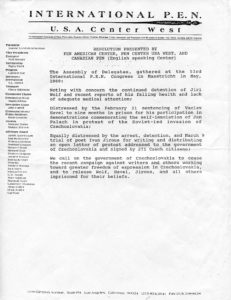
At the Congress PEN USA West, American PEN, Canadian PEN and Polish PEN presented a resolution on Czechoslovakia, calling for the government to cease the recent campaign against writers and to release Vaclav Havel and all writers imprisoned. The Assembly recommended that the International PEN President and International Secretary get permission from Czech authorities to visit Vaclav Havel in prison. Two weeks after the Congress Vaclav Havel was released. In December of 1989 Havel was elected President of Czechoslovakia after the collapse of the communist regime. In 1994, President Havel, along with other freed dissident writers, greeted PEN members at the 61st PEN Congress in Prague.
Also at the Maastricht Congress was an election for the new President of International PEN. Noted Nigerian writer Chinua Achebe stood as a candidate, supported by our two American Centers, Scandinavian centers, PEN Canada, English PEN and others, but Achebe was relatively new to PEN, and at the time there were only a limited number of African centers. Achebe lost by a few votes to the French writer Rene Tavernier, who passed away six months later.
Achebe admitted that he was not as familiar with PEN but said that if the organization had wanted him as President he had been persuaded that “it would be exciting.” He noted the world was very large and very complex. He hoped that in the years to come the voices of those other people would be heard more and more in PEN.
Our delegation had the pleasure of having dinner with Achebe in a castle in Maastricht which had a gourmet restaurant that served multiple courses with tiny portions. The small dinner, which also included the East German delegate and I think fellow Nigerian writer Buchi Emecheta and an American PEN member, lasted over three hours. I’m told when Achebe left, he asked his cab driver if he had any bread in his house because he was still hungry. When I saw Achebe a few times in the years following, he always remembered that dinner.
At the Maastricht Congress two new Africa Centers were elected: Nigeria, represented by Achebe, and Guinea. The election of these centers signaled a growing presence of PEN in Africa. Today PEN has 27 African centers.
A few weeks after we returned from the Congress to Los Angeles, tanks entered Tiananmen Square. Hundreds of citizens, including writers, were arrested and killed. One of my first thoughts was, what will happen to Bei Dao, but fortunately he hadn’t yet returned to China. Our small PEN office started receiving faxes from London with dozens of names in Chinese, and we and PEN Centers around the globe began writing and translating those names and mounting a global protest. Among those on the lists I am sure, though I didn’t know him at the time, was Liu Xiaobo, who was instrumental in helping protect the students and in clearing the square.
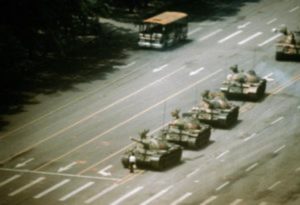
Tiananmen Square. June 4th, 1989. © 1989 Stuart Franklin/MAGNUM
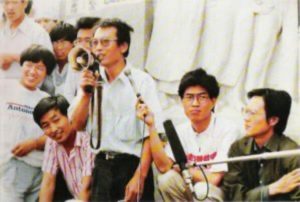
Liu Xiaobo (with megaphone) at the 1989 protests on Tiananmen Square.
Twenty years later Liu Xiaobo would be a founding member and President of the Independent Chinese PEN Center. He would also later help draft and circulate the document Charter 08, patterned after the Czechoslovak writers’ document Charter 77, calling for democratic change in China. In 2009 Liu Xiaobo was again arrested and imprisoned. He won the Nobel Prize for Peace in 2010 and died in prison in 2017.
The opening of the world to democracy and freedom which we glimpsed and hoped for and which seemed imminent in 1989 appears less certain now.
Today, June 3-4, 2019 memorializes the thirtieth anniversary of the tanks rolling into Tiananmen Square. During the years after Tiananmen when Liu Xiaobo and others were in prison I chaired PEN International’s Writers in Prison Committee. But that is a story to come…
Next Installment: PEN Journey 4: Freedom on the Move West to East